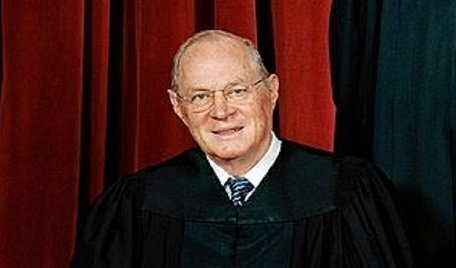On May 20, 1996, the Supreme Court issued an early landmark decision supporting the right of gay people under the Constitution to seek protection from discrimination.

The majority decision in Romer v. Evans was written by Justice Anthony Kennedy, who went on to play a prominent role in future decisions that affected the constitutional rights of LGBTQ people.
Link: Read The Decision
Along in the majority with Kennedy were Justices John Paul Stevens, Sandra Day O’Connor, David Souter, Ruth Bader Ginsburg and Stephen Breyer. The dissenters were Chief Justice William Rehnquist, and Justices Antonin Scalia and Clarence Thomas.
The issue in Romer v. Evans was Colorado’s Amendment 2, which was passed by a majority of the state’s voters in 1992. Amendment 2 barred any judicial, legislative, or executive action designed to protect persons in Colorado from discrimination based on their “homosexual, lesbian, or bisexual orientation, conduct, practices or relationships.”
Quickly, a legal challenge was launched, and a Colorado state trial court issued a permanent injunction stopping Amendment 2’s enforcement. The Colorado Supreme Court agreed with the lower court and the case went to the Supreme Court in 1996.
In the opening of his majority opinion, Kennedy cited perhaps the most-famous dissent in Supreme Court history, John Marshall Harlan’s stirring opinion in Plessy v. Ferguson.
“One century ago, the first Justice Harlan admonished this Court that the Constitution ‘neither knows nor tolerates classes among citizens,’” Kennedy said. “Unheeded then, those words now are understood to state a commitment to the law’s neutrality where the rights of persons are at stake. The Equal Protection Clause enforces this principle and today requires us to hold invalid a provision of Colorado's Constitution.”
Kennedy noted that a law can be sustained under the Equal Protection Clause, even if it seems to disadvantage a group, so long as it advances a legitimate government interest. “We must conclude that Amendment 2 classifies homosexuals not to further a proper legislative end but to make them unequal to everyone else. This Colorado cannot do. A State cannot so deem a class of persons a stranger to its laws.”
Justice Scalia’s dissent cited a previous Supreme Court decision, Bowers v. Hardwick, which he said allowed for moral objection to homosexuality to be reflected as a basis in democratic laws.. “Since the Constitution of the United States says nothing about this subject, it is left to be resolved by normal democratic means, including the democratic adoption of provisions in state constitutions,” Scalia said.
“The constitutional amendment before us here is not the manifestation of a “‘bare ... desire to harm’ homosexuals, . . . but is rather a modest attempt by seemingly tolerant Coloradans to preserve traditional sexual mores against the efforts of a politically powerful minority to revise those mores through use of the laws,” he added.
Lambda Legal, a group that advocates for gay and lesbian people and was involved in the Romer case, says the Romer decision was “the single most positive Supreme Court ruling in the history of the gay rights movement when it was decided.”
Later, in 2003, the Supreme Court overturned the Bowers v. Hardwick decision in another landmark case, Lawrence v. Texas. And again, Justice Kennedy wrote a majority opinion that vindicated gay rights—namely, to private adult consensual sexual conduct— in the face of laws that tried to restrict them.
“The Texas statute furthers no legitimate state interest which can justify its intrusion into the personal and private life of the individual,” Kennedy said.
Predicting the same-sex marriage cases that would soon come before the Supreme Court in subsequent years, Scalia in his Lawrence dissent said that “if moral disapprobation of homosexual conduct is ‘no legitimate state interest’ for purposes of proscribing that conduct . . . what justification could there possibly be for denying the benefits of marriage to homosexual couples exercising ‘[t]he liberty protected by the Constitution?’”







